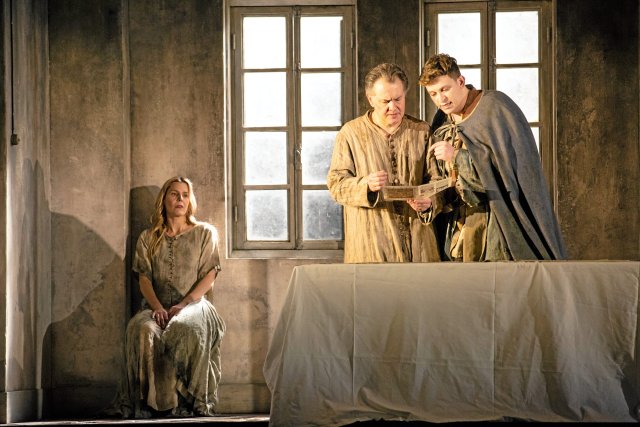The nasty “Protector” and the talented “Boy” think about pictures. “The woman” looks on and is silent. There is: boredom
Photo: Bernd Uhlig
In the Duden you learn: “modernist. Adjective. Meaning: to appear modern. Usage: often derogatory.” A work from 2012 celebrated its premiere at the Deutsche Oper Berlin last Saturday, January 27th, 2024. “Written on Skin” by the English modernist composer George Benjamin (64), once a favorite student of Olivier Messiaen, was premiered eleven and a half years ago at the summer open-air festival in Aix-en-Provence in the south of France. The libretto for Benjamin’s first major opera was written by Martin Crimp, a modernist playwright, based on medieval atrocities. “The Eaten Heart” by the Catalan troubadour Wilhelm von Cabestany and the “Decameron” by Giovanni Boccaccio are said to be the basis of the 90-minute S&M fever dream. A little bit of historical justification turns every modernist slaughterhouse into a subtle parable theater.
Essentially, it’s about a drama of jealousy between “the Woman” Agnès (Georgia Jarman, soprano), her husband the “Protector” (Marc Stone, baritone) and the “Boy” (Aryeh Nussbaum Cohen, countertenor), a boyish book illustrator. The latter is commissioned to create a paean to the life of his customer using what was once the most valuable of all document materials – parchment, dried animal skin. The result is a picture book full of atrocities against friends and enemies, which the Protector finds too unflatteringly close to reality. Meanwhile, his wife – he actually calls her and owns her that – raves about the subtle artist. Total sexual submission only lasts for a very limited time. She longs for tender kisses, true desire. And gets it. This, of course, ends badly.
nd.DieWoche – our weekly newsletter

With our weekly newsletter nd.DieWoche look at the most important topics of the week and read them Highlights our Saturday edition on Friday. Get your free subscription here.
Berlin bought the original production, more provincial than Provençal. One may ask, why? “Written on Skin” has already been updated as a co-production in Detmold-Stockholm and in Philadelphia, so it doesn’t have to look like Ikea Eurotrash and a tree-in-the-living-room set design from the last, most boring of decades. Katie Mitchell is responsible for directing, a regular accomplice of the librettist and a popular expert for domestic boredom on the stage. People know each other and recommend each other to everyone. In the little room, the only action space in the plot, there is a diffuse 13th century in yellowed paper beige, with copper pipes and a dry tree growing out of the ground. However, three quarters of the stage is used for purely decorative purposes. While the branches grow beyond the bed to the next floor, the left side has an open-plan office aesthetic. Black and white, desk lamps, plastic boxes for files, etc. When they are not in demand, the parked figures there move in slow motion. This has no decipherable meaning, but it makes a cinematic impression.
Multiple singers have multiple roles. The boy and two fleshly supporting characters are also angels. For this purpose, they put on clothes from the 21st century in the contemporary area of the stage design. Only football jerseys with the inscription “Now Angels 3” would have been even more catchy. Cherubim and seraphins refer to everything that is secretly desired and suppressed, but the music only refers to itself, to modernism. For two acts there is catatonia, a spasm, the uncomfortable sameness of every chromatic post-war composition. It whispers and screams over strings and brass, the percussion can click and clack. You’ve heard it all before, instrumentally with Pierre Boulez, vocally with Alban Berg and motivically with Hans Werner Henze. Lyricist Crimp noticeably tries to capture the infernal quality of the latter, the associated libretti by Ernst Schnabel and WH Auden, when a human heart is eaten on stage. Composer Benjamin underlines the most delicate scene of his musical theater with film-musical dynamics. The auditorium, if it isn’t already asleep, needs to sit up and take notice.
What’s common is when everyone knows what is meant when someone calls an opera “modernist”: an era that, in its predictability, has become a genre in itself. Someone who tries to create masterpieces that transcendentally enhance her solitary handiwork. Calligraphy with blood and calligraphy on skin. Repressed women and gay kisses as pretexts for topics in a society, plus “shopping center” and “airport” mentioned in the libretto for the good conscience of an audience.
Who remembers? Detlev Glanert’s commissioned composition “Oceane” premiered at the Deutsche Oper in 2019. Here you could experience the 19th century. Fontane on Strauss. Glowing reviews. So far it has been successfully sold once. The year before last I went to Bremerhaven.
Next performances: February 1st, February 5th, February 9th, February 15th
Become a member of the nd.Genossenschaft!
Since January 1, 2022, the »nd« will be published as an independent left-wing newspaper owned by the staff and readers. Be there and support media diversity and visible left-wing positions as a cooperative member. Fill out the membership application now.
More information on www.dasnd.de/genossenschaft
